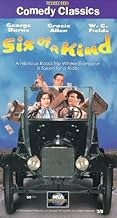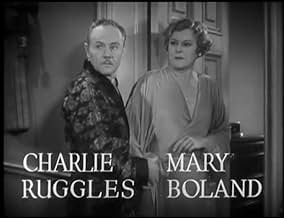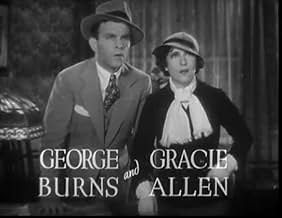When a respectable middle-class couple take a cross-country trip by auto, they share expenses with a decidedly oddball couple, none of whom know the car carries embezzled funds.When a respectable middle-class couple take a cross-country trip by auto, they share expenses with a decidedly oddball couple, none of whom know the car carries embezzled funds.When a respectable middle-class couple take a cross-country trip by auto, they share expenses with a decidedly oddball couple, none of whom know the car carries embezzled funds.
- Awards
- 1 win total
- J. Pinkham Whinney
- (as Charlie Ruggles)
- Traffic Cop
- (uncredited)
- Hotel Desk Clerk in Philipsburg
- (uncredited)
- Eyeshade Man
- (uncredited)
- Detective
- (uncredited)
- Woman
- (uncredited)
- Gillette's Secretary
- (uncredited)
- Drunk
- (uncredited)
- Tourist's Wife
- (uncredited)
Featured reviews
*** (out of 4)
A couple (Charles Ruggles, Mary Boland) are about to go on their second honeymoon when the wife gets the bright idea to save some money by placing an ad in the paper hoping to get another couple to go along and share expenses. A couple (George Burns, Gracie Allen) agrees to go but it's just one disaster after another especially when they get to a small town with a mixed up sheriff (W.C. Fields). Considering the cast you'd think this Leo McCarey comedy would be much better known but it's pretty much been forgotten over time. While it's far from a classic comedy there are enough good moments to make it worth sitting through and especially with a 62-minute running time. The biggest thing going against the movie is its screenplay, which really isn't all that good. At just 62-minutes it seems as if the movie is broken down into six, ten-minute vignettes and it really gives the movie a somewhat uneven film. With that said, enough of those vignettes work thanks in large part to the cast. Ruggles and Boland are very good together and share some great comic timing and especially in some early scenes dealing with how much she paid for the ad. Burns and Allen really don't get too much to work with as the screenplay pretty much keeps him in the background while she gets to play dumb. Even Fields role isn't the greatest but the comic legend does what he can with it. The real star of the film goes to the wonderful dog who is downright hilarious during his scenes and especially the ones where he's pushing Ruggles around.
But the value of "Six of a Kind" is more an artifact of particular players forever captured on film. Mary Boland is always excellent and she's wonderful here (but at her best a few years later in "The Women"). Charlie Ruggles essentially played the same role all his career and nobody plays Charlie Ruggles better. Alison Skipworth is barely utilized at all, here.
It's the preservation of W.C. Fields' immortal "Honest John" routine from vaudeville that earns "Six of a Kind" its place in film history. It's difficult to imagine how this routine worked from the distance of a stage. But on film it's a miracle of comic construction, timing, delivery and skill (yes he actually ricochets that billiard ball off the far end of the table where it bounces back and hits his forehead). The routine is hypnotic and hysterical, and perfectly pitched for film.
The Fields poolplaying routine is priceless. I've seen it before but cannot recall where. But its inserted into this project without reference to anything else. Incidentally, it works as well as it does because there is a watcher in the frame, a deadpan face that is every bit as valuable and practiced as the actor.
That's indicative of how the experiment fails as a whole. If you know "Mad Mad Mad World," you'll know a successful example where comedic methods actually do bump up against each other and generate something resonant, rich, higher.
In this case however, the comedic models take turns. Isn't as effective.
Ted's Evaluation -- 2 of 3: Has some interesting elements.
Did you know
- TriviaW.C. Fields refers to a woman named McGonigle. He took that name for his character in The Old Fashioned Way (1934). The actor had also used the name McGargle in Sally of the Sawdust (1925) and its remake, Poppy (1936).
- GoofsGeorge Burns' character Name is shown onscreen as "George Edward", but "Edwards" is consistently spoken as his surname.
- Quotes
Gracie De Vore: Oh, what's that?
George Edwards: You wouldn't understand. This is a map.
Gracie De Vore: Oh, sure, I know what a map is. It's what you take every afternoon when you're tired. I always take an afternoon map.
George Edwards: An afternoon map?
Gracie De Vore: Sure.
George Edwards: I bet when you went to school, you never even reached the fifth grade.
Gracie De Vore: Aw, don't be silly. I spent three of the happiest years of my life in the fifth grade.
- ConnectionsFeatured in L'univers du rire (1982)
Details
- Runtime
- 1h 2m(62 min)
- Color
- Aspect ratio
- 1.37 : 1





































